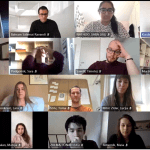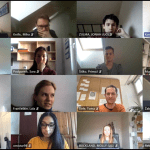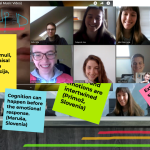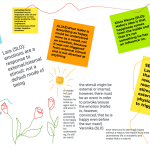You are here :
Introduction to Cognitive Science Cross-Campus Activity

Challenges in Exploring the Mind: An Interdisciplinary Approach
Since you woke up this morning and by the time you have read this, you have probably experienced many emotions. But what are emotions and how do we study them? Cognitive science offers an interdisciplinary way to study emotions. Through the EUTOPIA course, Introduction to Cognitive Science, you will gain a view into the rich world of emotions through the lenses of psychology, computer science and phenomenology. You will experience what it is like to participate in an online experiment and you will gain knowledge on emotions and the sciences of the mind. You will collaborate in interdisciplinary and diverse groups when solving thought-provoking challenges in the field of the studies of the mind. course will take place online between March and April where you will join with students from the EUTOPIA international learning community. The course consists of four lectures and a group assignment in which you will familiarise yourself with methods of eliciting and measuring emotions. Your participation and engagement in the course will take up to 25 hours.
The course aims to help students understand the interdisciplinary and collaborative nature of scientific inquiry in the sciences of the mind by integrating findings on selected cognitive phenomena from different disciplinary perspectives, developing skills of collaborative research and getting to understand basic concepts of cognitive science through learning about and researching selected cognitive phenomena. Students will collaborate in interdisciplinary and diverse groups when solving thought-provoking challenges in the field of the studies of the mind.
Students gain an understanding of the basic concepts of cognitive science through learning about and researching selected cognitive phenomena, such as emotions. They thereby develop an understanding and skills of interdisciplinary and collaborative approaches to the scientific inquiry in sciences of the mind. They learn how to integrate findings on emotions from different disciplinary perspectives with an emphasis on participation and cooperation with students from other European universities.




- DATE: March – April 2021
- LOCATION: Online seminars, lectures, experiments and groupwork (Teams)
- HOST: EUTOPIA LC Introduction to cognitive science – coordinated by Urban Kordeš (UL), Toma Strle (UL), Zarja Mursic (UL), Robert Lowe (UGOT), Elisabeth Blagrove (UoW)
- PARTICIPANTS: 34 UL/UoW/UGOT students (UG/MA/PhD)
- LEARNING OUTCOMES:
- Understanding the interdisciplinary and collaborative nature of research in cognitive science
- Understanding central approaches and challenges in today’s cognitive science
- In Practice: Developing skills of collaborative research through practical engagement in group work
- Conceptually: Recognising and tackling difficulties encountered in integrating knowledge from different disciplinary contexts
- Training in argumentation and articulation of own ideas; developing skills of scientific writing and presenting
- MORE INFO: brochure
TAKEAWAYS
“For me, the experience was really interesting, and I’m glad that I could be a part of it. At times, I got a bit concerned about all the time consumption and my capabilities to finish the project, but I feel lucky to be given a chance to participate.”
“I think that learning activitiy contributed a lot to my future studies in terms of sharing ideas with other students, to everyday life in terms of making new friendships and to research in terms of having another experience of team collaboration.”
“Emotions are not easily measured. I kind of knew that before the activity, but I got to experience it first-hand and that’s a priceless experience. Although emotions aren’t the field of study I want to pursue, it was also good as a life lesson on how complicated emotions are.”
“Definitely! It’s a new perspective into research you don’t come across typically in your degree.”
“But the activity was a good mixture of psychology, first-person research and statistics (which could be also viewed as part of psychology). The lectures also focused on neurosciences, so it was a good example of how a phenomenon can and should be viewed from different disciplines.”
“The Eutopia experience felt like being a part of a novel, exciting experiment, created with the aim to take advantage of the interdisciplinary and intercultural differences that enrich each of the participants. This resulted in a powerful mixture of different perspectives and thought-provoking moments. We gained precious knowledge on one hand and were challenged with critically assessing and questioning that same knowledge on the other. Overall, the Eutopia experience was a fresh, exciting way of gaining knowledge through various different activities and from a very broad circle of experts and each other.”



